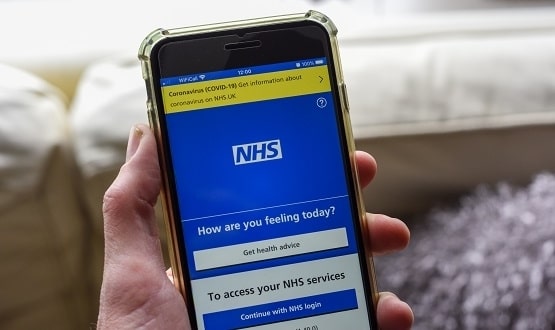Hancock’s ‘tech revolution’ to include mandatory open standards
- 17 October 2018

Matt Hancock has said a ‘tech revolution’ is coming as he outlines his plans for the use of digital technology in health and social care.
Outdated and obstructive NHS IT systems will become a thing of the past, the Secretary of State for Health and Social Care said, as he launched his technology vision.
Proposals in Hancock’s ‘The Future of Healthcare’ policy paper, described as his initial technology strategy, include ensuring there is a modern technology architecture in place; requiring all suppliers to adhere to common standards or cease to do business with the NHS; a commitment to commercial off the shelf technology; and allowing NHS organisations to choose to buy from any supplier that meets standards.
The document adds that “open standards, secure identity and interoperability” are crucial to the success of technology use in healthcare but adds “the gap between where we are and where we want to be is only getting bigger”.
In the document, Hancock also states digital services and IT systems which are used in the NHS will have to meet a clear set of open standards to ensure they can talk to each other and can be replaced when better technologies are created. The document talks of creating a plug and play architecture where any module can be swapped out, a far cry from the current mega-suite landscape characterised by customer de facto lock-in.
Such standards will be mandatory across the NHS and any system that does not meet them will be “phased out”.
The document also claims the government will look to end contracts with providers that do not understand these principles for the health and care sector, reiterating a stern warning he sent out to IT suppliers during his keynote speech at NHS Expo in September 2018.
There is also a reference to ready-made, off-the-shelf technologies that are available now.
The document says: “We should be using the best off-the-shelf technology where our needs are like everyone else’s, and not building bespoke solutions where they are not needed.”
Included in this commitment is the strongest message to date on moving NHS digital services en masse to the public cloud: “We start with the assumption that all our services should run in the public cloud with no more locally managed servers.”
Following the announcement of his plans, Hancock said: “The tech revolution is coming to the NHS. These robust standards will ensure that every part of the NHS can use the best technology to improve patient safety, reduce delays and speed up appointments.
“A modern technical architecture for the health and care service has huge potential to deliver better services and to unlock our innovations. We want this approach to empower the country’s best innovators — inside and outside the NHS — and we want to hear from staff, experts and suppliers to ensure our standards will deliver the most advanced health and care service in the world.”
Hancock’s initial technology vision has been launched alongside NHS Digital’s technology standards framework.
The standards will formalise the way IT systems talk to each other, to allow digital services to be built that cross organisational boundaries — for example, bridging the gap between primary and secondary care.
The aim is to allow local organisations to make the right technology choices for their area, whilst also maintaining appropriate and secure data access across the NHS.
Sarah Wilkinson, chief executive at NHS Digital, said: “Connected systems ensure that clinicians have immediate access to all relevant and appropriate patient data from all care providers and settings, and ensure that data is communicated between systems with absolute fidelity, eliminating misinformation and misunderstandings.
“In addition, we will increasingly be able to provide citizens and patients with direct and immediate access to their medical records.”





17 Comments
I am impressed with this site, real I am a fan.
Deja vu. What happened to these recommendations?
The four key recommendations by Martha Lane Fox to the National Information Board are:
* Reaching the ‘furthest first’ – making sure those with the most health and social care needs who are often the least likely to be online, are included first in any new digital tools being used across the NHS.
* Free Wi-fi in every NHS building.
* Building the basic digital skills of the NHS workforce to ensure that everyone has the digital skills needed to support people’s health needs.
* An ambitious target that at least 10% of registered patients in each GP practice should be using a digital service such as online appointment booking, repeat prescriptions and access to records by 2017.
Ditto ‘Wachter’, ‘Fit for 2010’ the 5- and 10-year plans and the host of other reports. articles and plain wishlists. If anyone can fit these into some grand plan, I’d like to see it. I’d call this a joke if it wasn’t so serious.
The technology has moved on but the basic principles haven’t changed since IfH was published way back in 1997. The vision is sound but where is the money coming from?
Recent experience with a Cloud project leaves me to conclude that the potential opportunities are massive but are only feasible with a move from capital to revenue funding.
The current commissioning environment means that many Trusts don’t have the predictable and reliable long term revenue streams needed to enter into long term Cloud contracts. In general, the longer the Cloud contract, the lower the annual cost – so uncertainty over long term income is costly.
So just two cheers from me until someone has approved a national business case and the Chancellor sets aside new ring-fenced funding over at least a five year period.
Come back Richard Granger; all is forgiven.
It would help me and the rest of the world if someone can specify the NHS root problem(s) top which technology is the solution. RCA (root cause analysis) is common in IT before taking actions,, I see NO RCA from dear Matt before charging into his Gadarene technology rush although I am sure his heart is in the right place over this.
Interoperability is motherhood and apple pie. Everyone agrees it is good.
The question is who do we want defining the standards?
Who is going to do the difficult and messy technical work?
Who is going to bang heads together and make it happen?
PRSB is a big expensive chocolate teapot. I have not seen anything come out of this organisation and be implemented. They subcontract everything to RCP so why do they exist?
INTEROPen seems to be much more focused on getting stuff working, but is a young organisation, but I like what they have been doing.
We need a more diverse group of people doing this work, and we need to be measuring outcomes, not processes.
If you take the cash to do a piece of interoperability work and it can’t be shown working, you haven’t done anything useful. More importantly, you have prevented someone competent doing that job. This incompetence has a significant time cost to suppliers and the NHS.
Check what they are doing in the US where they talk about interoperability standards ad nauseam but I’ve never seen any pragmatic solutions spelled out. APIs and message queuing (MQ) do get a mention though as interop. candidates but you still need to know who wants what from where and when and not try to boil the ocena with a generic solution.
Much to be commended in the policy. But let’s get get this aligned with other NHS E / DHSC policies such as Carter not recognising that back office costs need to rise to provide digital services and that the occasional capital grant to a small number of Trusts does not support the revenue model of cloud based services.
… and very much reflects the thinking we spelled out 3 years ago …
Sounds much like what we were all talking about 10-15 years ago….
The RCR Imaging Informatics team have also been advocates of open standards for many years. Radiology is probably the most advanced area in this respect.
This initiative is welcomed, as keeping to open standard will transform inter -system, -departmental, -hospital and inter-regional cooperative working.
Just need to make sure the _right_ standards are chosen, and we all choose the _same_ standards!
That’s the great thing about standards: there are so many to choose from! Surely in a monolith like the NHS the standards must be mandated?
One would hope so!
@William “Radiology is probably the most advanced area in this respect.” In some ways yes, IHE being a case in point.
But how many RIS/PACS are truly modular? Most I’ve seen are very monolithic.
How many are cloud native?
How many expose “public” FHIR APIs? (Public as in available for developers not unsecured).
How many have native modern browser UIs that use web standards like HTML5 rather than legacy or proprietary plugins?
Technology is a tool to execute processes designed by/for/to help ‘stakeholders’, in this case medics of all kinds. Matt is going innocently down the well-trodden path to oblivion by throwing technology at problems before they have even been defined properly and in such a way as to aid designed mitigating actions on them. Once that has been done, technology enters the equations.
My view, based on a lot of research and personal experience is that the NHS ‘communications’, in all its forms, are broken, do not interface or are non-existent.
Excellent. Can I put a few suggestions forward.
1. Keep it simple, build on what we already have and share it.
2. Don’t ‘HBOS’ it up
3. Allow informatic’s clinicians to set the long term aims and direction but accept clinicians in the field need a lot less to achieve a lot more.
4. Stop looking at problems in isolation, focus on the patient (entire pathway) and all people involved (admins, medics, nurses, doctors, etc)
5. Discuss the problems with developers and not dictate the technical solution.
Can’t wait!
This is enormously welcome and very much reflects the thinking we spelled out 3 years ago in the Newcastle Declaration on Interoperability https://www.digitalhealth.net/2015/09/ccios-issue-newcastle-declaration/ . Personally, I think health IT could be about to enter a golden age. Set aside party politics and let’s get on board.
Comments are closed.